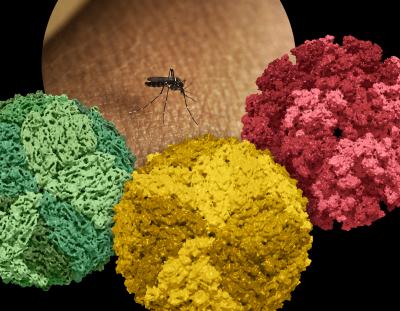NIAID Raises Awareness to Malaria-like Diseases in W. Africa
Dengue, Zika, Chikungunya Viruses in Mali; Disease Likely Misdiagnosed
NIAID scientists and colleagues have identified dengue, Zika and chikungunya viruses in the West African country of Mali, where health care providers likely misdiagnose patients with illness from those viruses due to unavailable diagnostic tools. Because malaria is the most common fever-causing illness in rural sub-Saharan Africa, most medical workers presume patients with a fever have malaria. The primary cause of all four infectious diseases is a mosquito bite.
Records from the Malian Health Information System show that about one-third of all patient visits to health care facilities are related to malaria, with 2.37 million clinical cases.
A new study from NIAID’s Rocky Mountain Laboratories and the University of Sciences, Techniques and Technologies in Mali aims to help spread information to medical workers about the existence of the additional viral diseases. Ideally, circulating the information will help them obtain the necessary diagnostics.
The study, published in The American Journal of Tropical Medicine and Hygiene, involved 600 residents, 200 from each of the southern Malian communities of Soromba, Bamba and Banzana. The scientists detected antibodies to dengue virus in the blood of 77.2% of the residents tested; to Zika virus in 31.2%, and to chikungunya virus in 25.8%. They detected at least one of the three viruses in 84.9% of participants, meaning just 15.1% tested negative to any of the three viruses.
Evidence of the parasites that cause malaria was found in 44.5% of those tested. Unlike malaria, however, where most cases are found in children under age 14, residents over age 50 were most likely to have been exposed to dengue, Zika or chikungunya viruses.
“Despite the high exposure risk to dengue virus in southern Mali, dengue fever cases have rarely been reported,” the researchers write. “This is likely due to the lack of diagnostic testing and the biased clinical focus on malaria in the region. Awareness of dengue virus as a cause of febrile illness needs to be urgently established in medical communities as an important public health measure.”
The scientists are hoping data from a more in-depth clinical study that just ended will provide additional details about the prevalence of these viruses in Mali. They also are planning to examine patients who have undiagnosed fevers to establish infection rates.
NIAID scientists are investigating dengue, Zika and chikungunya viruses to try and develop preventive and therapeutic treatment options, none of which exist.
Reference: S Bane, et al. Seroprevalence of Arboviruses in a Malaria Hyperendemic Area in Southern Mali. The American Journal of Tropical Medicine and Hygiene DOI: 10.4269/ajtmh.23-0803 (2024).


